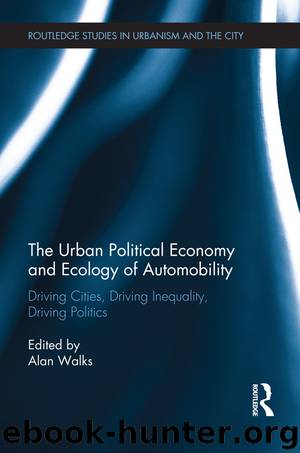The Urban Political Economy and Ecology of Automobility by Walks Alan

Author:Walks, Alan
Language: eng
Format: epub
ISBN: 9781317659679
Publisher: Taylor & Francis (CAM)
Immigration control, automobility, and migrants’ livelihoods in the US
“What do we want?”
“Driver’s licenses!”
“When do we want them?”
“Now!”2
Automobility and migrant rights have become increasingly politicized as multiple levels of the US government respond to pressures from grassroots anti-migrant and pro-migrant activists to include or deter undocumented migration (Ansley 2010; Pabon Lopez 2004; Slack 2007). Undocumented migrants’ access to car licensing has been curtailed in nearly all US states, while numerous local police and traffic authorities have gained immigration enforcement powers. These patterns have been unevenly witnessed across US cities and states, but can be understood as a broad, post-9/11 shift towards new sub-national forms of immigration control as they intersect with the securitization of automobility governance. As previously mentioned, the driver’s licence is a technology of citizenship. Undocumented migrants’ capacity to live and work in particular jurisdictions is in part shaped by the ability to drive, irrespective of formal federal legal status. Driver’s licences also act as close-to-universal forms of identification, necessary to open bank accounts, travel by plane, or rent housing (Varsanyi 2006: 246).
Until the late 1990s undocumented people in the US were able to legally drive in most state jurisdictions. Over several decades, this practice was curtailed under strong pressure from grassroots immigration policy activism. In 1986, 1996, 2001, and 2006, a range of legislative measures were passed by the US federal government alongside numerous “locally generated grassroots policies” that tackled the presence of undocumented residents (Wells 2004: 1308–1310). These measures encompassed both exclusionary and inclusionary policies. These measures reversed the 100-year-old ruling that the US federal government possessed “plenary power”, or sole authority, over immigration policy (the geopolitical power over the legitimate means of exclusion, expulsion, and entry from and to the US). Notably, these shifts overturned the legal obligation of subnational levels of government to ensure the welfare of all residents of their jurisdiction on the principle of non-discrimination. Through section 287(g) of the US Immigration and Naturalization Act and the post-9/11 Secure Communities programme, municipal, county, and state agencies (such as police, traffic, and by-law agencies) have been able to enter into agreements with federal immigration enforcement authorities to act on the latter’s behalf (Coleman 2012). Together, these shifts have “activated a formidable battery of legal and material resources that limit the movements, rights and opportunities of immigrants in the United States” (Varsanyi 2010: 129). These “grassroots” efforts indirectly yet intentionally target undocumented people’s access to services required to sustain basic livelihoods. I argue that they are also an under-recognized facet of a transformation in the governance of automobility from a problematic of public safety to one of national security (Packer 2008: 267–292).
California was one of the first American states to pass a law in the 1990s that prevented an estimated two million undocumented California drivers from obtaining or renewing driver’s licences. In 2003, a bill was passed that removed these restrictions, but Arnold Schwarzenegger overturned the bill in his first act as governor. Prior to 9/11, few states other than California required legal immigration status in order to legally drive and own cars.
Download
This site does not store any files on its server. We only index and link to content provided by other sites. Please contact the content providers to delete copyright contents if any and email us, we'll remove relevant links or contents immediately.
| Coloring Books for Grown-Ups | Humor |
| Movies | Performing Arts |
| Pop Culture | Puzzles & Games |
| Radio | Sheet Music & Scores |
| Television | Trivia & Fun Facts |
The Social Psychology of Inequality by Unknown(3018)
Make Comics Like the Pros by Greg Pak(2910)
Stacked Decks by The Rotenberg Collection(2880)
Purple Hibiscus by Chimamanda Ngozi Adichie(2822)
The Queen of Nothing by Holly Black(2586)
The Art of Doom by Bethesda(2152)
Life of Elizabeth I by Alison Weir(2072)
Putin's Labyrinth(2016)
The Power of Habit: Why We Do What We Do in Life and Business by Charles Duhigg(1998)
Drawing Down the Moon by Margot Adler(1865)
Things Are What You Make of Them: Life Advice for Creatives by Adam J. Kurtz(1845)
Agency by William Gibson(1823)
Wall and Piece by Banksy(1820)
Art Of Atari by Tim Lapetino(1787)
Teaching to Transgress: Education as the Practice of Freedom (Harvest in Translation) by Bell Hooks(1768)
The Beatles Lyrics by Hunter Davies(1717)
The Pin-Up Art of Bill Ward by Bill Ward(1693)
Only What's Necessary: Charles M. Schulz and the Art of Peanuts by Chip Kidd(1687)
The Andy Warhol Diaries by Andy Warhol(1598)
